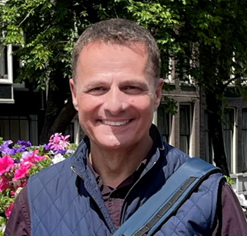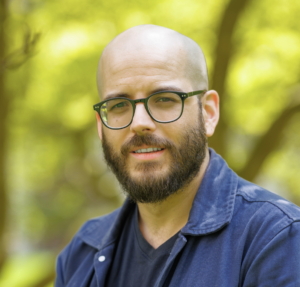Voices from the Field
Download Voices from the Field

Keith Storace is a registered psychologist with the Psychology Board of Australia (PsyBA) and an associate fellow with the Australasian College of Health Service Management (ACHSM). He manages a private practice at Kiku Imagination where he applies the Appreciative Dialogue (ApDi) therapy program to assist individuals move toward, strengthen and enjoy what is meaningful while dealing with the challenges they encounter along the way. Keith has been the editor of the Voices from the Field column for AI Practitioner since 2016.
Following the publication of my article Appreciative Inquiry and the Young Philosophers: Cultivating Hope and Agency in a Complex World (AI Practitioner, September 2025), many readers reached out asking for more practical guidance on how to apply the ten principles in conversations with young people. In that initial article, I described young people — who are our thought leaders of tomorrow — as “young philosophers,” because their questions, reflections, and evolving perspectives can shape the future as powerfully as their actions. This follow-up piece is a direct response to those requests. It explores how parents, mentors, coaches, educators, and counsellors can translate these principles into reflective practices that help young people deepen their self-understanding, strengthen their sense of agency, and actively participate in shaping their own unfolding stories.
The Young Philosophers, Part II: Applying the Ten Principles of Appreciative Inquiry as a Pathway to Growth
Adolescence is a time of deep transformation. It’s when questions of identity, belonging, purpose, and agency surface. Many young people, however, are expected to have answers before they have had the time or space to explore these questions for themselves. In a world that values speed, reaction, and surface engagement, taking time to reflect can feel countercultural – but it is exactly this slowing down that enables deeper insight and growth.
Reflection is more than just introspection; it is an active, constructive process. It creates coherence in the stories young people tell about themselves. It uncovers strengths that might otherwise go unnoticed. It sheds light on choices in situations that seem limited. Most importantly, it shifts the sense of meaning from something to be found “out there” to something that can be created from within.

1. Constructionist principle: Language shapes experience
The stories we tell ourselves become the reality we live in. Language doesn’t just describe our experience – it actively shapes it. For young philosophers, learning to listen to their internal dialogue and reshape it is a key act of agency. Changing the words they use can alter how they interpret challenges, how they see themselves, and how they approach growth.
Reflective process:
- Notice the phrases you use when talking about yourself, especially during tough times.
- Try using language that views your situation as evolving rather than fixed.
- Reflect on how one change in words can shift how you feel and what you believe is possible.
Example: If a young philosopher notices they often say, “I’m failing”, they can reframe this to “I’m learning”. This isn’t about sugarcoating reality – it’s about recognising that language influences belief. As words move from self-blame to a growth mindset, internal stories become more positive, creating space for persistence and creativity.
2. Simultaneity principle: Curiosity itself is an action
Change does not wait for the future – it starts the moment a new question is asked. In Appreciative Inquiry, inquiry itself is a generative force. For young philosophers, learning to ask different questions is a way to redirect focus, shift perspective, and unlock movement where there once was stagnation.
Reflective process:
- Become aware of the types of questions you ask when things feel tough.
- Replace questions that shut down thinking (“Why can’t I…?”) with ones that open it up (“What might help here?”).
- Notice how your mood, behaviour, and outlook change as soon as curiosity enters the situation.
Example: In a moment of frustration, a young philosopher might ask, “Why is this going wrong?”. If they instead ask, “What matters most in this situation?” the question itself begins to reorient their focus towards priorities and strengths. The very act of inquiry becomes the first step towards meaningful change.
3. Anticipatory principle: The future takes shape in the images we hold of it
The future doesn’t just happen – it is rehearsed in the present through imagination. The stories young philosophers tell about what lies ahead directly shape their choices today. When they become conscious of these imagined futures, they gain the power to choose and cultivate the ones they want to grow into.
Reflective process:
- Bring awareness to the future scenarios running silently in your mind.
- Notice how any negative rehearsals (like anticipating failure) shape current behaviour.
- Practise rehearsing qualities like courage or kindness and observe how they influence the choices being made right now.
Example: If a young philosopher repeatedly imagines themselves failing at a new task, their body may respond with anxiety and avoidance. But if they imagine themselves navigating challenges with determination and calm, they start to behave in ways that make that outcome more likely. The future they visualise becomes a self-fulfilling map for the present.
4. Poetic principle: What we choose to notice becomes the story we live
Our experiences are vast, yet we only live within the parts we choose to notice. This principle teaches young philosophers that where they place their attention determines the narrative they build around themselves. Expanding their field of attention helps them construct richer, more balanced stories of who they are and how they are growing.
Reflective process:
- Notice what moments you highlight when reflecting on your day.
- Explore how including different details – not just the hard ones – changes the story.
- Reflect on how your chosen focus shapes your thinking and understanding.
Example: A young philosopher might initially describe their day as “a disaster” because they stumbled during a presentation. But when they also notice the encouragement they received and the progress they made, the narrative becomes more nuanced. They see not just a mistake but also resilience, support, and growth – all of which are equally true and more empowering.
5. Positive principle: Recognise what strengthens rather than what drains
Human beings, like plants, tend to grow towards what gives them life. Paying attention to sources of strength and vitality is not about ignoring problems – it’s about building the energy needed to address them. For young philosophers, cultivating an awareness of what sustains them lays the groundwork for resilience and agency.
Reflective process:
- Identify the moments in your day when you felt most engaged, alive, or connected.
- Explore what conditions made those moments possible.
- Consider how to create more of those conditions in your daily life.
Example: A young philosopher might recall that they felt most energised while mentoring a peer. Recognising this as a strength – the ability to connect and support – helps them see new ways to contribute meaningfully. These strengths-based insights become stepping stones for purposeful action.
6. Wholeness principle: How we value every part of ourselves and see how it belongs to the whole
Wholeness is the practice of welcoming all aspects of the self – including the parts we would rather ignore or hide. Growth occurs when young philosophers learn that vulnerability, uncertainty, and doubt are not weaknesses to suppress but parts of a complete, authentic identity.
Reflective process:
- Identify parts of yourself you often silence or ignore.
- Reflect on how these parts might have wisdom or value.
- Practise integrating them into your self-understanding rather than pushing them away.
Example: A young philosopher might resent their cautious side, believing it holds them back. But when they recognise that caution also helps them make thoughtful decisions, they begin to see it as a strength. This integration reduces internal conflict and builds a more coherent, compassionate sense of self.
7. Enactment principle: How we live our values now is already a step towards the future we want
“Becoming” is not a distant event – it is something we practise now. Every action taken today that reflects the values of the future self helps bring that version of the self into being. For young philosophers, this means they don’t have to wait to “become” – they can begin right now.
Reflective process:
- Identify a quality or role you aspire to embody in the future.
- Choose a small action today that reflects that aspiration.
- Reflect on how these actions influence how you see yourself.
Example: A young philosopher who wants to lead with kindness might make a conscious effort to listen deeply to a friend today. This act is not a rehearsal – it is leadership in action. By living a small part of the future now, they begin to embody the person they wish to become.
8. Narrative principle: See that the stories we tell can open or close possibilities
The stories we tell about ourselves shape what we believe we’re capable of. They can quietly set boundaries or open up new directions, influencing the choices we make and the risks we’re willing to take. When young philosophers learn to question and rewrite those stories, they realise that identity isn’t fixed – it’s something they can shape and reshape as they grow.
Reflective process:
- Identify the recurring stories you tell about who you are.
- Ask yourself if those stories are complete or if new perspectives could be added.
- Experiment with telling a story that emphasises growth, effort, and change.
Example: A young philosopher who often says, “I’m not the type to speak up”, can challenge this story by recognising times they did express their views. By rewriting their narrative as, “I’m learning to share my voice more often”, they expand their identity and the range of choices available to them.
9. Free Choice principle: Notice where choice is still possible, even in small ways
When life feels beyond our control, there are still decisions we can make – about how we respond and where we direct our energy. Recognising these small but meaningful choices reminds young philosophers that, while they may not shape the situation itself, they can shape their experience within it.
Reflective process:
- Identify areas, however small, where there is still a choice.
- Make intentional decisions in those areas.
- Reflect on how those decisions change the experience of the situation.
Example: A young philosopher might not be able to change a difficult assignment, but they can choose how they approach it – with resentment or with curiosity. That choice alone can shift their energy, engagement, and the meaning they attach to the experience.
10. Awareness principle: Acknowledge the full range of what we feel without turning away
Awareness invites young philosophers to approach their inner world with openness and curiosity. Instead of avoiding uncomfortable feelings, they learn to see them as signals – messages about what matters most. Emotional literacy deepens their capacity for empathy and resilience.
Reflective process:
- Pause and notice emotional responses without judgement.
- Ask what each feeling might be trying to communicate.
- Practise holding multiple emotions together without rushing to resolve them.
Example: A young philosopher might feel both sadness and excitement before moving to a new school. Instead of trying to push one feeling away, they can acknowledge that sadness honours what they’re leaving behind, while excitement celebrates what’s ahead. Holding both allows for a richer, more integrated experience.
Living the principles
These ten principles form more than a reflective framework: they are a way of being. They teach young people that language shapes identity, that questions create change, that the future is already unfolding, and that their stories are theirs to rewrite. They remind them that every part of themselves belongs, that choice is always possible, and that emotions carry wisdom rather than weakness.
When we guide young philosophers through these pathways, we help them move beyond passive reflection into active authorship of their lives. In doing so, we give them more than tools for coping – we nurture their capacity for meaning, agency, and connection in a complex and changing world.









 Andrew Lynch
Andrew Lynch Cees Hoogendijk
Cees Hoogendijk
